2024 Legislative District 14 Candidates
Candidates running for Legislative District 14:
Senate (1 seat):
- Warren Petersen (incumbent)
- Elizabeth Brown
House (2 seats):
- Joel Coen
- Laurin Hendrix (incumbent)
- Lalani Hunsaker
- Andrew Jackson
- Scott Menor
- Khyl Powell
- Kristine Clark
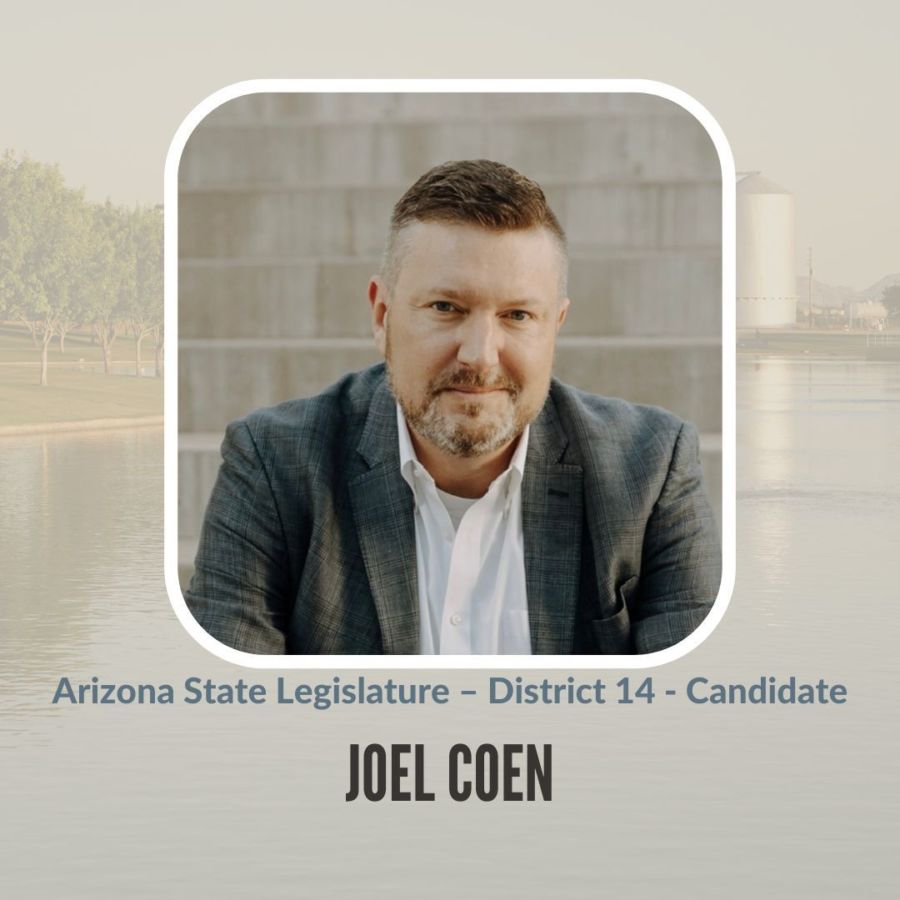
Campaign Email Address: joel@coenforaz.com
Campaign website or social media account: Coenforaz.com
Community/Neighborhood of Residence: Spectrum
How many years have you lived in District 14?: 12
Name of Employer: TruNorth Advisors
Occupation or Title: Business Owner
Brief Summary of Employment: I have owned businesses in Arizona since I moved here. I owe a lot to our community for the success we have experienced as such.
Educational Background (List Format): Regis University | Bachelors in Business Management | Cum Laude
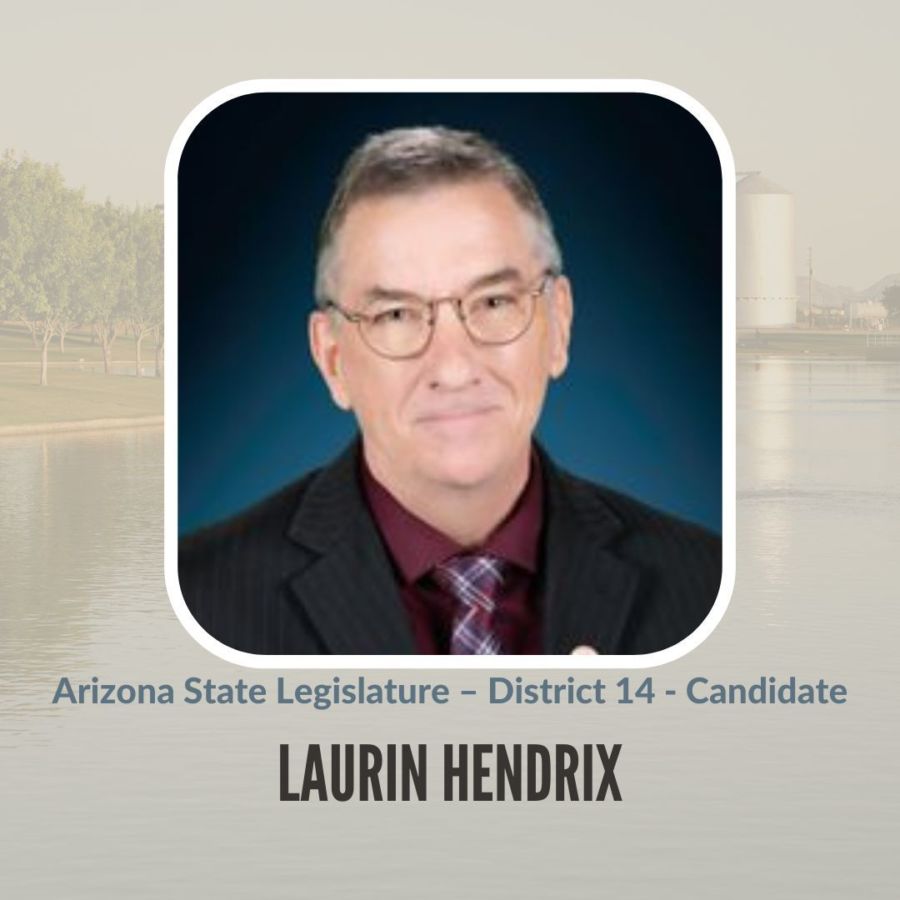
Campaign Email Address:
Campaign website or social media account: www.VoteHendrix
Community/Neighborhood of Residence: I have lived in Gilbert for over 30 years.
How many years have you lived in District 14?:
Name of Employer:
Occupation or Title: I am the owner and general manager of Accurate Lien.
Brief Summary of Employment: I have been self-employed since college. I have owned businesses in a variety of industries, including general contracting, cabinet manufacturing, legal services, auto repair, restaurant, import/export, pest control, countertop manufacturing, and business consulting.
Educational Background (List Format): I have completed a B.S. degree from the University of California with some post graduate education and multiple certifications in various fields of study.
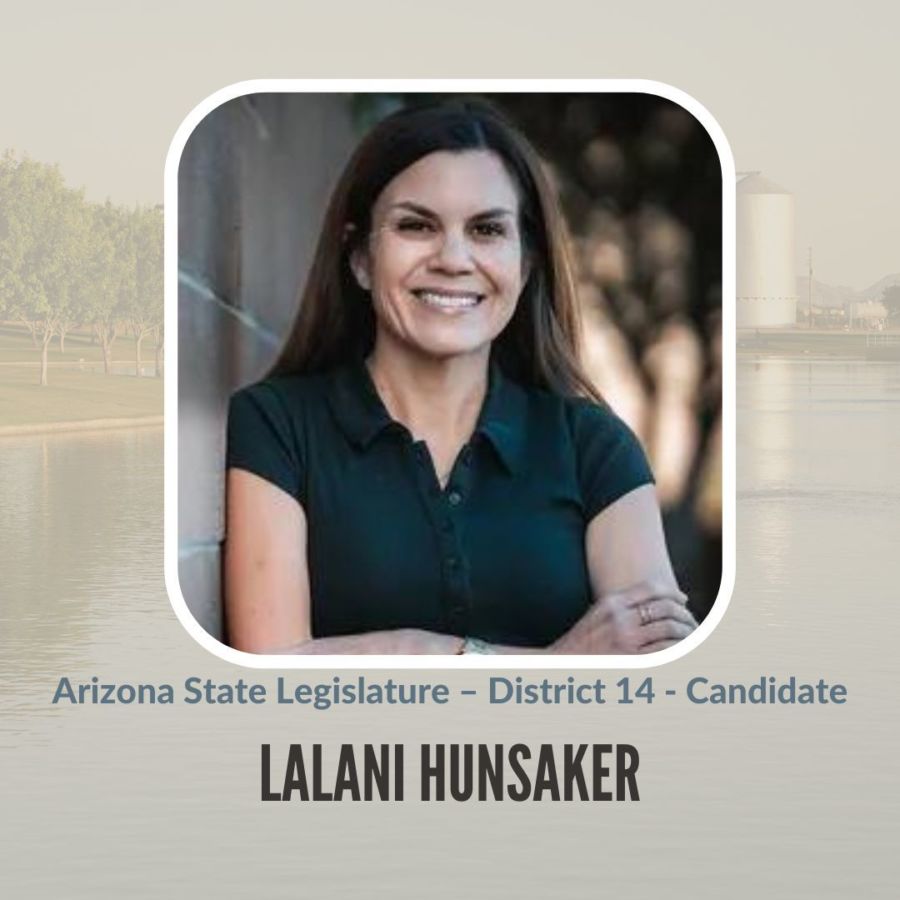
Campaign Email Address: votelalani@gmail.com
Campaign website or social media account: votelalani.com or @votelalani
Community/Neighborhood of Residence: Seville
How many years have you lived in District 14?: 19
Name of Employer: Charter One
Occupation or Title: Director of Government Relations
Brief Summary of Employment: I do all of the policy work and strategic planning for a large charter school EMo
Educational Background (List Format): Double Major in History and Political Science with a teaching credential
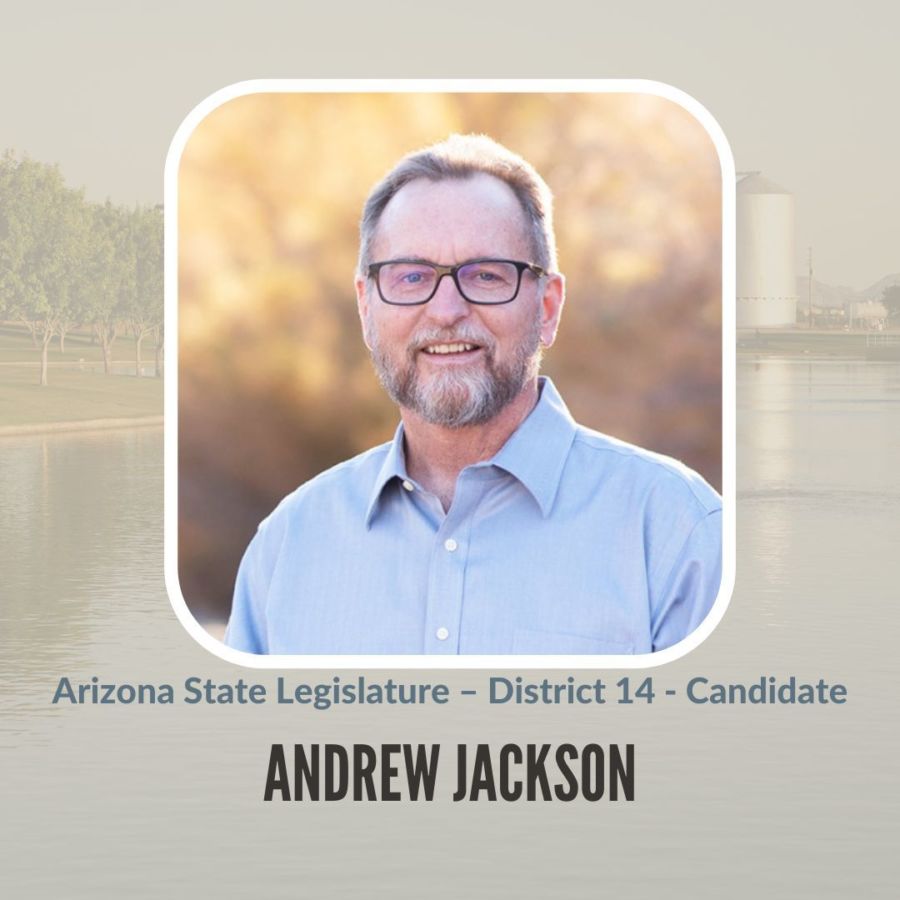
Campaign Email Address: Contact@DrAndrewJackson.com
Campaign website or social media account: AndrewJacksonAZ.com
Community/Neighborhood of Residence: Gilbert
How many years have you lived in District 14?: 28 years
Name of Employer: Semi-Retired
Occupation or Title: Pastor (22 years), Professor, Tour Guide Israel and Turkey
Brief Summary of Employment: Pastor, Professor, Bible Lands Guide
Educational Background (List Format): B.A. Northwest University
M.Div Fuller Theological Seminary
Doctorate Gordon-Conwell Theological Seminary"
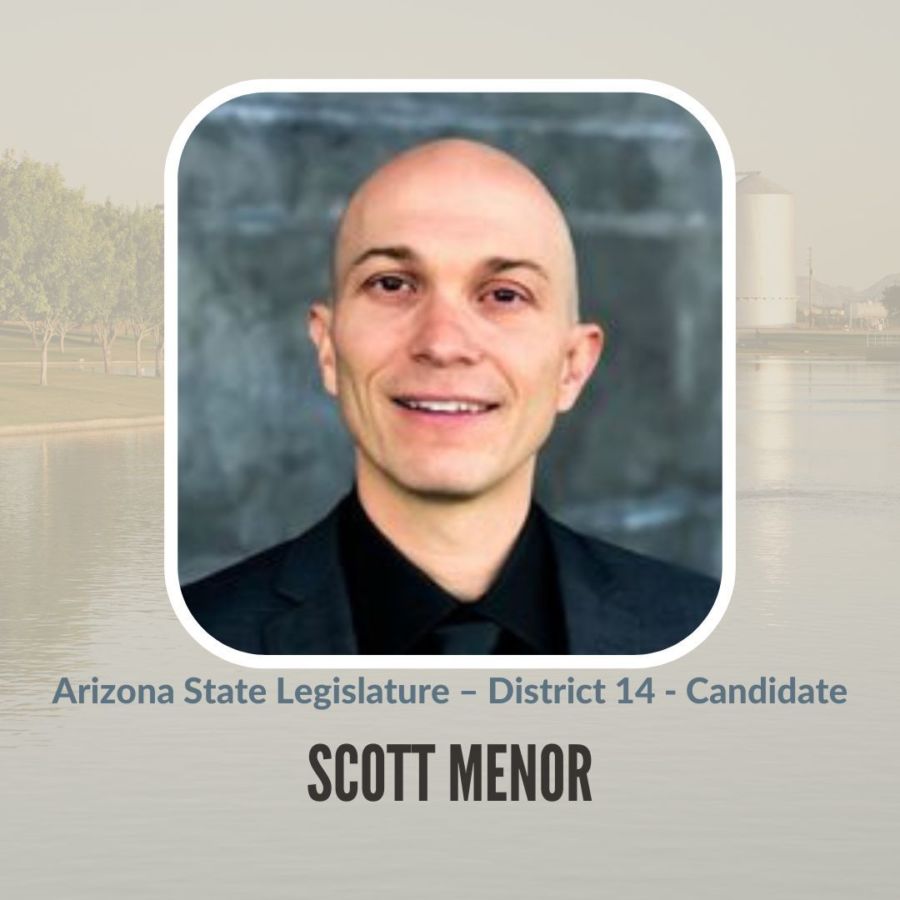
Campaign Email Address: scott@smenor.com
Campaign website or social media account: https://smenor.com/
Community/Neighborhood of Residence: Gilbert
How many years have you lived in District 14?: 5
Name of Employer: Arizona State University
Occupation or Title: Postdoc
Brief Summary of Employment: entrepreneur and researcher
Educational Background (List Format): BA Mathematics, BS/MS Microbiology, PhD Physics
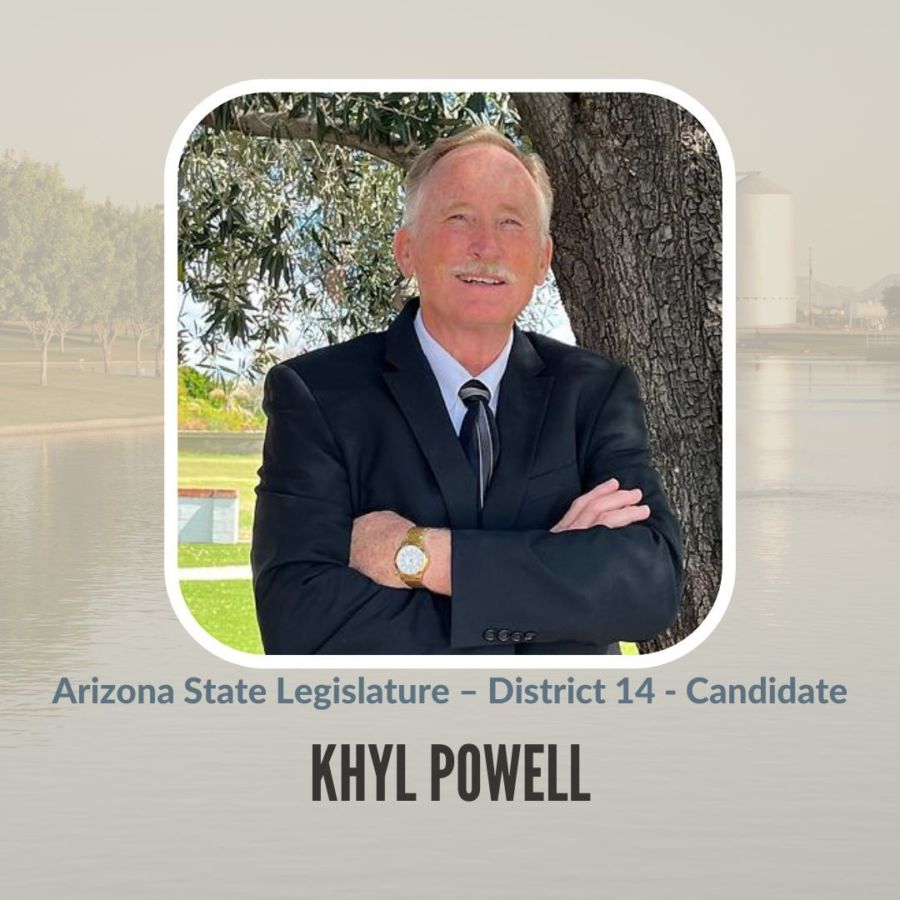
Campaign Email Address: 480-813-0627
Campaign website or social media account: KhylPowell.com
Community/Neighborhood of Residence:
How many years have you lived in District 14?: 27 years
Name of Employer: Self Employed for 45 years
Occupation or Title: Real Estate Developer
Brief Summary of Employment: I served the greater Phoenix area as the President and owner of a multi-million dollar service company for 24 years. I have consulted and engineered service solutions for fortune 500 companies. I was recognized as a finalist by Ernst and Young Entrepreneur of the Year and member of the Who's Who Outstanding Business Executives, served in the BSA organization for over 35 years and was a recipient of the BSA Silver Beaver award. I own and have managed a successful Industrial Real Estate Development company in Gilbert for 20 years. I served on the Small Business Alliance board lobbying the Town of Gilbert as an advocate for small business.
Educational Background (List Format): Prince George, Maryland
Phoenix College, Phoenix
Major: Business and Business Management
AZ. College Special Teaching Certificate
OSHA #501 Trainer in Occupation Safety and Health for the General Industry
BSA Woodbadge Leadership Development
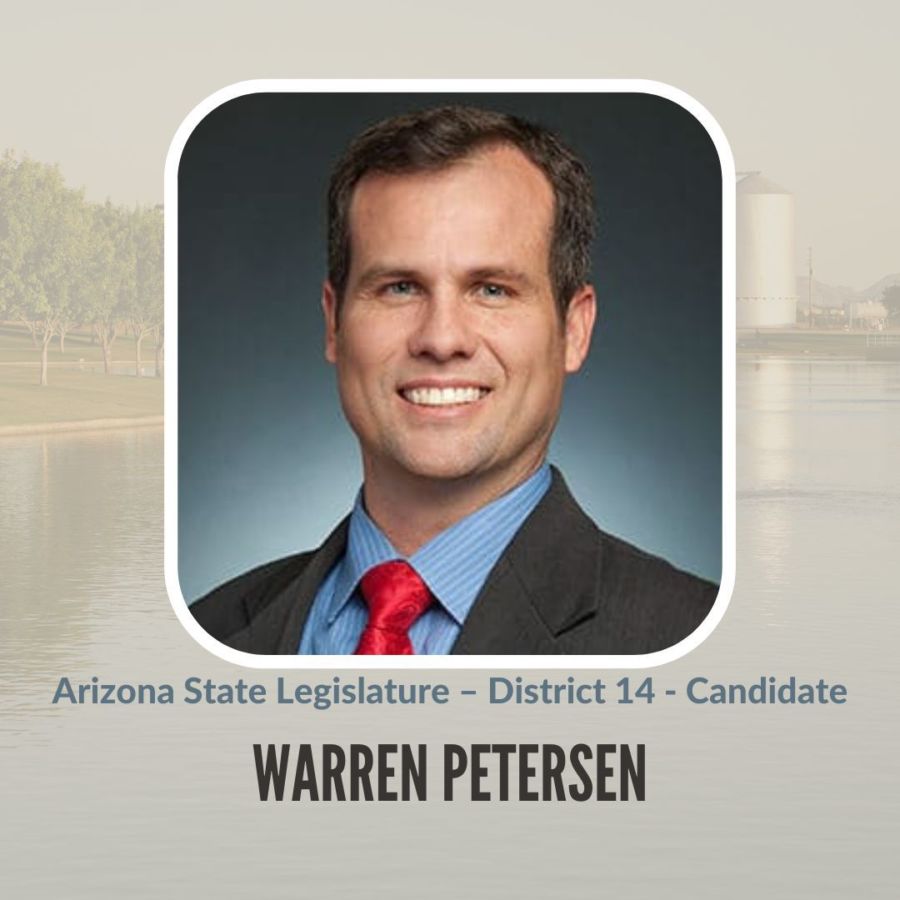
Campaign Email Address: votewarren@gmail.com
Campaign website or social media account: Votewarrren on X
Community/Neighborhood of Residence: Gilbert, AZ
How many years have you lived in District 14?: 3rd Generation Resident of Arizona
Name of Employer:
Occupation or Title: Real Estate Broker/Attorney
Brief Summary of Employment: 25 years in the Real Estate Industry
Boy Scouts, NRA, Precinct Committeeman, SEVRAR
Educational Background (List Format): Gilbert High Graduate
Bachelor's Degree, ASU
Juris Doctorate ASU, Cali Award Recipient, Willard H. Pedrick Scholar
Name at least two specific policies you would support to help small businesses thrive and grow in Arizona.
- Joel Coen: Support for Trade Schools: My policies aim to elevate the quality and accessibility of trade schools in Arizona, recognizing their pivotal role in mitigating skill shortages and fostering the growth of small businesses. Key Measures include: Financial Incentives: Provide grants and tax incentives to trade schools that expand training in high-demand trades. Partnerships with Small Businesses: Foster collaborations to tailor training that meets industry needs, ensuring students acquire relevant, employable skills. Modernization of Training Equipment: Allocate funding to update training facilities to current industry standards. Career Placement Programs: Implement comprehensive services to facilitate graduates' entry into the workforce, benefiting local businesses. Expected Impacts: Economic Growth: Increase in skilled workers to reduce labor shortages and boost productivity. Support for Small Businesses: Enhanced workforce skills reduce training costs and improve business competitiveness. Social Benefits: Better employment opportunities and wages for graduates improve community stability. Sustainability: Focus on sustainable practices supports Arizona’s environmental goals. Strengthening Infrastructure: This policy aims to enhance Arizona's infrastructure to support small businesses through practical and sustainable solutions. Key Measures include: Upgraded Digital Infrastructure: Improve broadband access/reliability/speed with cost-sharing programs (negotiated through vendors) to assist small businesses. Transportation Improvements: Invest in roads and public transit to improve connectivity and reduce transit times through public-private partnerships. Energy Efficiency Programs: Offer incentives for small businesses to adopt energy-efficient technologies, subsidizing the initial costs. Streamlined Regulatory Processes: Simplify the permit process to reduce bureaucracy and expedite project approvals. Expected Impacts: Cost Reduction: Enhanced technology and transportation reduce operational expenses. Economic Growth: Attract new businesses and stimulate local economies. Enhanced Business Competitiveness: Improved infrastructure allows businesses to expand their market reach. Sustainability and Resilience: Prepare for future challenges with investments in energy-efficient infrastructure. These initiatives are designed to create a supportive environment for businesses, driving economic growth and ensuring a sustainable future for Arizona.
- Laurin Hendrix: I have proposed, and will continue to propose, that a legislative committee be dedicated to reducing unnecessary regulation and bureaucracy for small businesses. I will continue an effort to lower corporate income tax rates. Finally, all assessments on personal property owned by businesses should be eliminated on a permanent basis. I have sponsored efforts to accomplish or further all of these goals in the past and will continue to do so.
- Lalani Hunsaker: Eliminate squatters from private property and support small businesses in keeping their assets, employees and customers safe. Continue to reduce unnecessary regulations that impact businesses ability to do business efficiently. Increase educational options for a skilled workforce to provide the resources that businesses need to thrive in Arizona.
- Andrew Jackson: Support free markets (economic freedom) Keep Arizona’s government regulations limited, and taxation low.
- Scott Menor: There should be steep penalties for commercial real estate that is vacant for more than 6 months. This would use market forces to drive the cost of rent down to market value and discourage long-term hoarding of vacant properties due to perverse incentives such as writing off losses. As in Paris with boulangeries and patisseries, there should be generous subsidies for small and particularly locally / family businesses. The Phoenix Light Rail should turn right on Gilbert Road and go downtown making local Gilbert businesses much more accessible for people living further away.
- Khyl Powell: PROTECTING EMPLOYER'S WORKPLACE POLICIES - Arizona's current status as a ""Right to Work"" and ""Employment at Will"" state. Overall, the federal government is the largest employer in the nation. In 2020 the federal government had slightly over 1 million employees with an average salary of $85K. In 2022 the federal government had over 1.5 million employees with an average salary of $97K. With the increase in the number of employees within the federal government unions have increased their strength and influence. The general attitude of the federal government and it's alarming growth threatens each state within our nation. It is essential that legislatures within the state of Arizona take an active role in strengthening the state's constitution and commitment to protect and keep Arizona from yielding to the federal government's demands. The economic strength of Arizona is directly proportionate to the strength of small, medium and large businesses. We absolutely must protect our businesses environment from regulation that takes away control and rights of businesses. It is absolutely critical and essential that Arizona never allows nor adopts the idea that ""government know best"" or that ""businesses must be more regulated by government"" to be successful. Every effort needs to be made to reduce state and federal regulations that infringe upon the ability of businesses to make management and employment decisions that benefit them and allow continual flexibility to adapt to changes in the economic environment. IMMIGRATION - The EVCCA takes a strong position on securing our southern border and maintaining active policies to resolve issues involving illegal immigrants. The state of Arizona is enormously threatened by the population of illegal immigrants. We have a substantial need for affordable housing. We have two to three families of illegal immigrants living in one house. Legal residents of Arizona are also struggling with affordable housing. College students leave college with enormous debt and can't qualify for technical employment because they lack training. Basic construction jobs are filled with illegal immigrants making it nearly impossible for others to be employed. Employers are overwhelmed with the lack of trained quality labor. The healthcare institutions are flooded with undocumented illegals placing heavy workloads on medical personnel. Mandated regulations associated with illegal immigrants have increased the cost of healthcare driving the cost for family healthcare to be nearly as high as their residential mortgage. Heavy burdens have been placed on public services and a general level of fear has permeated Gilbert neighborhoods. I absolutely believe local communities and the State of Arizona must put the integrity and needs of families first and do all they can to provide well trained police and fire personnel. Schools should be allowed to establish guidelines and policies that protect our children and focus on academics. We have to be extremely active in promoting and establishing safe communities.
- Warren Petersen: My focus has been on cutting red tape, protecting individual rights and making sure our citizens have access to great educational opportunities and jobs. These are important because it is critical that we get out of the way of businesses and individuals and let them create, innovate and prosper. A strong economy ensures we can pay for all the priorities of government including education, infrastructure and public safety. Arizona has great educational opportunities. My daughter graduated from high school with over 30 college credits. Students in Arizona can attend one of the top high schools in the country. No other state has three of the top ten high schools like Arizona does. And when you consider how states like Texas, California dwarf us in population that is quite an accomplishment.
What is your position on taxation and regulation of businesses in Arizona, and how would you propose to strike a balance between supporting businesses and protecting consumers?
- Joel Coen: My position on the taxation and regulation of businesses in Arizona emphasizes a balanced approach that encourages economic growth while ensuring robust consumer protections. I support implementing a competitive, yet fair tax structure with tiered tax incentives for businesses that contribute positively to the community, such as hiring locally. To simplify the tax process, I propose streamlining the tax code, reducing the administrative burden on small and medium enterprises and enabling them to reinvest in their operations and communities. Regarding regulations, I believe they are crucial for protecting consumers and maintaining fair market practices but should not hinder innovation. I advocate for a regulatory sandbox that allows businesses to test innovative products and services in a controlled environment with regulatory oversight, protecting consumers while fostering innovation. Additionally, I propose a periodic review of regulations to update or eliminate outdated or burdensome ones in consultation with business leaders and consumer groups. To effectively balance business interests with consumer rights, it is essential to strengthen consumer rights laws to enforce transparency and fairness, and promote corporate responsibility initiatives that align business operations with consumer and community welfare.
- Laurin Hendrix: My position on taxing businesses and regulation of business was covered in the previous question as I discussed legislation that I have sponsored. As for the balance between supporting businesses and protecting consumers, I disagree with the premise that there is a conflict between these two concepts. Supporting businesses with lower taxes and less regulation benefits the consumer in the form of better products and lower prices. Social media plays a clear role in consumer protection by creating and steering free market demand. I do not agree that government reduces consumer protection by promoting lower taxes and reduced regulation
- Lalani Hunsaker: My philosophy is that Arizonan’s should keep more of what they make. I trust Arizonan’s to spend their money better than bureaucrats. I’m supportive of Arizona’s new flat income tax. It’s simple, low and predictable. I also believe that regulations on businesses should not be egregious. We need to allow the free market to work.
- Andrew Jackson: Keep taxation and regulations as low as possible. I do not see there needs to be a conflict between supporting businesses and protecting consumers. Quality businesses care about their customer service and care. I would want a free market process, with less government intrusion.
- Scott Menor: State and local taxes need to be refactored to remove perverse and anti-competitive incentives. Consumer and employee protections / other regulations should exist and be strictly enforced *BUT* they need to be regularly re-evaluated and optimized to remove as much bureaucracy and red tape as possible. The corporation commission needs to be massively reformed to make filing for business licenses and LLCs / other corporations and entities as easy and painless as possible with no annual fees or franchise taxes for qualifying small and locally owned businesses
- Kyhl Powell: I have been self-employed for over 45 years. During those 45 years the state and federal government regulation was a constant threat to my business. I was required to hire professional personnel as well as outsource other business functions just to meet the requirements of government regulations. Financial burdens tied to government regulations put business out of business all the time. Many small businesses are not even aware of all the government reporting and payroll requirements. They fall behind and then are penalized and punished. Businesses are forced to dedicate monies to pay the cost of regulations, which could be used to provide higher wages to employees. I will do all that I can to identify and reduce unnecessary regulation, cost and taxation placed on businesses. I don't believe that government should be involved in business/customer policies. Consumers are smart enough, to choose which businesses they support. If a business wants to be successful, they will do all they can to meet the needs of their customers. Capitalism invites competition and competition compels businesses to meet the needs of their customers.
- Warren Petersen: My position is that currently, businesses are overtaxed and over-regulated. I have a long proven record of cutting taxes and cutting red tape. As far as protecting the consumers I believe the focus should go on the bad actors. When something bad happens, too often government overreacts with excessive regulation and punishes the good actors. The bad actors just keep breaking the laws but the good actors suffer. I have found the laws are already in place but often need to be enforced. The solution is to put a focus on the executive (law enforcement) in prosecuting and punishing the bad players. Keep the regulations light for the good actors and double down on the bad ones. This will reward the good businesses and deter the bad actors
How would you propose addressing workforce development and training to ensure Arizona has a skilled workforce to support businesses?
- Joel Coen: To effectively address workforce development and training in Arizona, my proposal focuses on substantially enhancing the role of trade schools and specialized job training programs. This approach is designed to bridge the gap between educational outcomes and the specific skills demanded by today's industries. Central to this initiative is the expansion and support of trade schools that offer targeted training in sectors critical to our state’s economy. By increasing funding and creating more accessible pathways into these programs, we can ensure that more individuals acquire the technical skills necessary for high-demand jobs. Additionally, I propose establishing stronger partnerships between these trade schools, local businesses, and industry leaders to tailor training programs directly to the needs of the job market. This collaboration will ensure that the curriculum is continuously updated to reflect technological advancements and market trends, making our workforce not only well-prepared but highly sought after by employers. To complement these efforts, I would also enhance job placement services that connect graduates directly with employment opportunities, ensuring that newly trained workers can transition smoothly into relevant positions. This would not only improve employment outcomes but also provide businesses with a steady stream of skilled labor tailored to their specific needs. By focusing on strengthening trade schools and enhancing job-specific training, Arizona can develop a highly skilled workforce that supports robust business growth and drives economic success in our communities.
- Laurin Hendrix: Workforce development should be handled by community colleges, universities, and the private sector. Targeting government funding for workforce development continues to evolve at a state level. I support allowing educational funding to be provided to the private sector on a similar basis to which it is provided to the public sector for workforce development and training. I further support policies that will encourage K-12 schools to continue to partner with community colleges to create workforce-ready graduates.
- Lalani Hunsaker: A skilled workforce is vital to both keeping and maintaining high quality businesses in Arizona. We are doing a good job of attracting such businesses but continuing to prioritize and provide a pipeline for skilled labor will help us to maintain it. I think we need more CTE options for high school and community college students in high demand fields where waitlist currently exists. We also need to educate students as to their options when it comes to quality jobs that exist. Finally, I think that we could partner with the businesses that need the labor to help off set education costs thru tax incentives.
- Andrew Jackson: We must promote a competitive educational marketplace, vocational training is important. Preparing people for the workforce must begin in high school. Businesses are diverse in their needs, and so we must have numerous training options in the public and private spheres.
- Scott Menor: One major thing that needs to be reformed is that although education and vocational training are often conflated, they are distinct things and one does not substitute and should not be used for the other. Our Constitution needs to be amended to remove 「 as nearly free as possible 」 and make public universities free strongly encouraging people to get broad liberal arts education including arts, literature, the humanities, philosophy, etc because those things enrich our lives and make us better citizens and / in particular help us understand and make better decisions at the ballot box. At the same time, we should have specific public vocational training that is separate and distinct to ensure people who are interested in pursuing careers in skilled trades are able to do so. Further, both of these need to be supported such that people pursuing them can focus on their studies and have housing, food, and healthcare because the alternative of trying to do both and work through training only makes it much harder and less likely that people will learn and succeed.
- Kyhl Powell: If Arizona wants to have a skilled workforce to support businesses Arizona colleges and universities need to reduce the cost of education. Additionally, academia needs to place their priorities on educating their students. Advancements in technology forces businesses to recruit educated individuals from out of the country because our institutions of higher learning are failing Americans. I strongly recommend that corporations and business insist on working relationship with college and universities that develop and focus on the specific education our youth need to be successful.
- Warren Petersen: We need better communication between the employers and the schools. The technical schools are good start. We also need to make sure that Universities are providing meaningful degrees. We should continue to fund programs that are proven successful career paths like the sciences. Programs that do not translate to a job that can make money should only be funded with private tuition. Government should get out of subsidizing meaningless degrees.
What plans or policies would you propose or support to attract new businesses to the state, and how would you encourage them to invest in local communities?
- Joel Coen: To attract new businesses to Arizona and encourage their investment in local communities, I propose leveraging our state's robust infrastructure, favorable climate, competitive tax environment, and vibrant economy. My strategy encompasses several key initiatives aimed at making Arizona an even more appealing destination for business operations and investment. Infrastructure Investment: We plan to continue enhancing our state's infrastructure, ensuring that businesses have access to modern and efficient transport systems, state-of-the-art telecommunications, and reliable energy sources. These improvements not only facilitate smoother operations but also reduce overhead costs for businesses. Tax Incentives: Arizona's already competitive tax structure will be bolstered through additional incentives for businesses that choose to set up operations here. These incentives will be particularly targeted at companies that commit to making long-term investments in our communities and creating local jobs. Favorable Business Climate: The state will promote its stable and inviting climate—both meteorologically and economically—as ideal for business operations, particularly for industries sensitive to weather disruptions. Our year-round good weather is perfect for industries ranging from manufacturing and logistics to technology and recreation. Economic Development Programs: We will introduce and expand programs that support small and medium-sized enterprises in their growth phases, offering grants and funding opportunities for innovation. Special emphasis will be placed on sectors that leverage our unique economic strengths and contribute to sustainable growth. Community Engagement and Development: To ensure that businesses are not just moving to Arizona but are also investing in its communities, we will facilitate partnerships between incoming businesses and local organizations. This will include support for community-based projects and initiatives that enhance local quality of life and provide tangible benefits to residents. Workforce Development: Aligning with our economic ambitions, we will enhance our focus on developing a highly skilled workforce. Through partnerships with trade schools and higher education institutions, we will ensure that businesses have access to a talented pool of candidates equipped with the skills needed in today's and tomorrow's job market. By implementing these policies, Arizona will not only attract new businesses but also ensure they are integral participants in our communities, contributing to and benefiting from the economic vitality and quality of life that define our great state.
- Laurin Hendrix: Arizona has a very competitive environment for attracting new businesses to the state. As a state, we have strived for many years to create a business-friendly environment of low taxes, high quality education, and limited regulation. Arizona must continue to reduce regulation, shrink government, and protect property rights to continue to improve and maintain the business friendly environment that we have already created. Affordable housing in Arizona is becoming an impediment to attracting new businesses and employees. The state must find a way to increase the supply of housing to offset the excess demand that we are seeing. At least a dozen different bills have been introduced this year that take varied approaches to increasing the supply of housing, with an emphasis on entry level housing.
- Lalani Hunsaker: We need to increase skilled labor, good transportation corridors and options to moves goods and services, affordable housing options and safe communities for their employees to live in.
- Andrew Jackson: Housing availability, low crime, family-oriented communities, and educational choices/options for children.
- Scott Menor: As a multi-time founder and small business owner who has recruited highly qualified people from around the country, the first thing I would do is properly fund and support K-12 education and beyond. Well educated and highly trained / qualified people will not move to a state that is near the bottom in the country in public education and it is well established that every dollar invested in public education consistently and reliably has ROI better than anything we could reasonably hope for in our personal lives in terms of franchise and property taxes, property values, etc. What we have been doing for decades bleeding our public schools dry has only hurt us and made it much more difficult to attract/recruit and retain people.
- Kyhl Powell: Arizona needs to continue to make every effort to attract new business by keeping business taxation as low as possible, to reduce unnecessary building regulation and cost for the development of residential neighborhoods, prevent Green Energy regulations from adding more restrictions and higher cost and focus on our local transportation system and infrastructure. The best way to encourage businesses to invest in the local communities is to enable them to be successful. When taxation and regulations are reduced businesses will pay higher wages. When businesses pay higher wages, they attract better employees. Higher quality and better paid employees help create successful local communities and neighborhoods.
- Warren Petersen: The fact that more than 200 people move here a day as well as major businesses shows that I have been part of the majority that has been passing pro growth, pro business policies for the last 13 years. It took us more than a decade to build but it can fall quickly. We need to continue to maintain a positive business environment by maintaining low taxes, quick licensing turnaround, and light regulations. Quality education is also a must.
What role, if any, do you see for local chambers of commerce in promoting economic growth and development in Arizona, and how would you interact with the Chamber if you were elected?
- Joel Coen: Local chambers of commerce play an indispensable role in fostering economic growth and development in Arizona, a fact that I have experienced personally. The chamber was a pivotal element in the success of my business, and I fully support their mission and initiatives. If elected, I plan to strengthen the partnership between the state government and local chambers of commerce. Recognizing their deep understanding of the local business landscape, I would ensure that they are integral to shaping our economic policies and development strategies. Regular consultations with chamber leaders would be a priority, ensuring that state initiatives align with the needs of the business community and effectively address its challenges. I would also advocate for increased funding and support for the chambers, enhancing their ability to serve local businesses and promote economic prosperity across our communities. By empowering local chambers and leveraging their expertise, we can create a more robust and supportive environment for businesses throughout Arizona.
- Laurin Hendrix: The Chamber is a valuable resource in offering education to the business community. As for interacting with the Chamber, my door is always open and I value collaboration to support businesses of all sizes.
- Lalani Hunsaker: I think that local Chambers are fantastic advocates for local businesses and communities. They have the finger on the pulse of what is happening in the sphere in which they operate. I would definitely use theirs as one data point in helping to understand various issues and how they impact both business and the community.
- Andrew Jackson: Local chambers are crucial for businesses and economic development. I would want a strong working relationship with the Chamber.
- Scott Menor: Local chambers of commerce are in a unique position to move us forward and get us to be an actual developed country. Unfortunately they often block progress by pushing back against things that would help small businesses like blocking public transit and multi-family housing initiatives both of which make it harder to build density to support local businesses with foot traffic and they impose a tax on employees and customers alike by forcing them to waste money on cars. Bringing more people into town and reducing the friction for them getting and living places would be a boon to small businesses by reducing the cost of labour and giving people easier access to goods and services and more disposable income to spend in them.
- Kyhl Powell: I support the business priorities the Gilbert Chamber of Commerce and the Alliance have identified, i.e., 1. Lowering the cost of doing business, 2. Building a trained workforce, 3. Increasing private sector jobs, and 4. Efficient and effective government. I would offer one suggestion to amend the final priority from "Efficient and Effective Government" to "Strive for transparent and less government." Government will automatically be more efficient and effective when it is transparent and less onerous. If I am elected, I will be delighted to represent not only LD14 but also assist the EVCCA, more specifically the Gilbert Chamber of Commerce to create bills that free businesses from onerous government regulations and I will do all that I can to block all bills that negatively impact state and local businesses.
- Warren Petersen: The chamber plays a critical role in connecting businesses with government and other businesses. They also put forward important legislation and advocate for pro business policies.
Arizona has two programs, Empowerment Scholarship Account (ESA) and Arizona Christian School Tax Credit (ACSTO), that provide public funding to families to educate their children at private or charter schools. There has been a move to cut one or both of these programs to reduce current and future budget shortfalls. What is your position on the proposal to cut or eliminate funding for either of these programs and why?
- Joel Coen: As a committed advocate for school choice, I value the Empowerment Scholarship Account (ESA) and the Arizona Christian School Tax Credit (ACSTO) for their role in empowering Arizona families to choose the best educational environments for their children. It is crucial, however, to ensure that the benefits of these programs do not come at the expense of our public schools. If elected, I would prioritize a balanced approach to funding that safeguards public school resources while supporting the freedom of school choice. This would involve implementing innovative funding mechanisms that can expand the total budget available for education, thus ensuring that enhancements to programs like ESA and ACSTO do not detract from the funds allocated to public schools. Additionally, I would advocate for stringent accountability measures for all schools receiving public funds, ensuring they meet high educational standards and contribute positively to our community. This balanced policy approach will ensure that every Arizona student has access to quality education, regardless of the type of school they attend.
- Laurin Hendrix: I will not support any cuts to the ESA or ACSTO programs. These programs allow taxpayers to direct some of their tax dollars to the exact place that they want those dollars spent. They also facilitate the ability of parents to choose where and how their children will be educated. There are very few opportunities for taxpayers to directly influence how their tax dollars are allocated. I fully support both of these programs. I do not disagree with the premise that budgetary cuts may be necessary in the future as economic cycles continue to occur. I also agree that ESA and ACSTO programs are popular targets for the labor unions. There are numerous options for other budgetary adjustments. Rather than reducing educational choice, I would begin by temporarily deferring some large scale capital construction projects.
- Lalani Hunsaker: I do not think that we should cut these programs. We need to provide options for quality education to all Arizona families and parents should be able to choose how those dollars are best spent.
- Andrew Jackson: I am a very strong advocate for educational competition (public and private). I would want to expand educational opportunities and not cut them. Fully support ESA and ACSTO,.
- Scott Menor: You will probably disqualify me for saying this but these programs are horrible and should absolutely be eliminated. School Choice and the such *SOUND* good but all these actually do is to bleed our public schools dry in order to hand money to people who by and large don't need it. All these voucher and tax credit and so on programs do is erode our public education and make it much harder to have locals who are well educated to hire and they make it massively more difficult to recruit people because they see our ranking and won't move someplace where they know their kids won't get a good education. They also massively increase crime because well funded public schools do far more to prevent crime than all the law enforcement in the world [ and that is not my opinion, it is an absolute and well-established fact. Religious people would benefit far more from a policy of laïcité which protects their rights without imposing any particular religion's standards and rules / tenets on those of us who are of different religions or no religion at all.
- Kyhl Powell: The idea that we need to eliminate ESA and ACSTO is bogus. Both of these programs empower parents to enable their children to receive superior educations. The proposal that the state of Arizona should eliminate any opportunities for a better education for children and adults is pure ignorance. Knowledge is power. Wisdom comes from the proper application of knowledge. Let us be wise in doing all we can to promote all settings of academia and scholarship from home schooling to post graduate studies in our state universities.
- Warren Petersen: These programs are a fraction of the total piece of the education pie but there are parents who believe this is the best way to educate their child. Arizona has been the leader in school choice and needs to remain that way. I support all choices for parents whether it is district, charter, private, ESA or home schooling. Parents should decide. As far as money goes. ESAs save the taxpayer money. The average total funding to educate a child is 13k. The average cost of an ESA is 7k. The false and deceptive narrative that ESAs cost more is because it does cost more to the state general fund. However, when all funding sources are considered, it is about half.
Is there anything else you would like to share?
- Joel Coen: I am really thankful for the opportunities that I have been given here in the city of Gilbert and in the State of AZ.
- Lalani Hunsaker: I am excited to be able to represent LD 14 citizens and families at the Arizona State House. I think that my conservative common sense approach to government will help move Arizona into a future that is vibrant and prosperous.
- Andrew Jackson: No
- Scott Menor: While I assume many people in the chamber may have a knee-jerk reaction against me and my positions, I sincerely hope you will hear me out and really consider the things I have said here and will say in my interview even out of sheer self-interest because my positions are based on evidence and my own personal experience starting and running businesses. Things are not bad here but could be so much better and many of the things the Chamber tends to oppose which I would propose and advocate are actually extremely pro-business and / in particular small and local businesses and they would be a boon not just in the short term but for us all to build and grow and maintain stronger and healthier businesses in the long-run. Thank you for your time and consideration, ~ S
- Kyhl Powell: I am an individual that loves God, my country, my family and personal liberty. I was raised by loving parents that instilled in me values and principles of integrity, altruism, honesty, loyalty, hard work, education, to be upstanding and forthright, to love and serve my fellowman, to defend our freedoms, to help the weak and the oppressed, to sustain our constitution and to never be afraid to stand up for what is right. I have always lived by the pledge to be anxiously engaged in doing good things.
- Warren Petersen: Proven Record and Legislative Experience: As a result of my voting record I have been named legislator of the year by small business organizations like NFIB. The state GOP awarded me the Champion of the Taxpayer of the State Senate and I have the highest lifetime score for Constitutional voting with the American Conservative Union in the State of Arizona. I have served as Commerce Chair, Vice Chairman of Appropriations, House Majority Leader and currently as the Senate President. I have also served as a member of the Ways and Means, Finance and Ethics committee. I have a proven record of helping small business owners. I’ve carried priority legislation for the Gilbert Chamber including HB2147 to address unemployment fraud and I helped pass legislation to curb frivolous lawsuits. I’ve carried several bills for the prior governor to close down inefficient departments, eliminate or streamline licensing and add business advocates to boards and commissions that regulate the business industry. I have been at the table for most of the budgets over the last 12 years. It would be hard to find a legislator who has more experience on key legislative action. Business experience: I have worked in the real estate industry for over 25 years. I own a small business. I make a payroll, I hire people, I deal with red tape. The real estate industry was devastated during the great recession. Half the industry was wiped out. I was blessed to be able to weather the recession. But a big reason I did was because we made wise and conservative fiscal decisions. These are traits I have taken to the Capitol. Dedication and hard work: It’s not easy to get meaningful legislation passed. It takes dedication, hard work and courage. When I ran HB2147 the media was brutal, the ACLU and unions were on the attack. I stayed the course and we got it all the way to the governor’s desk. I’ve consistently been recognized by business organizations as a hard worker.
